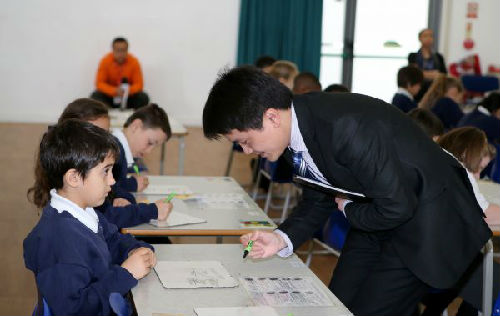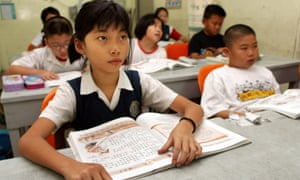日志
British Schools Hope to Improve Performance by Adopting Chinese Math Textbooks
||
https://www.theguardian.com/education/2017/mar/20/chinese-maths-textbooks-to-be-translated-for-uk-schools
British students may soon study mathematics with Chinese textbooks after a “historic” deal between HarperCollins and a Shanghai publishing house in which books will be translated for use in UK schools.
China’s wealthy cities, including Shanghai and Beijing, produce some of the world’s top-performing maths pupils, while British students rank far behind their counterparts in Asia.
HarperCollins’s education division signed an agreement to release a series of 36 maths books at the London Book Fair, the state-run China Daily reported, with Colin Hughes, managing director of Collins Learning, calling it “historic”.
“To my knowledge this has never happened in history before – that textbooks created for students in China will be translated exactly as they have been developed, and sold for use in British schools,” the China Daily quoted Hughes as saying.
The textbook deal is part of wider cooperation between the UK and China, and the government hopes to boost British students’ performance in maths, Hughes added.
Chinese schools, represented by those in the wealthier cities of Beijing, Shanghai and Guangzhou, as well as Jiangsu province, ranked fifth in maths scores, according to a recent global study by the Organisation for Economic Co-operation and Development.
The UK lagged far behind, ranking 27th and tied with Portugal and the Czech Republic in maths achievement.
The report also noted that one in four students in China, along with Singapore, Hong Kong and Taiwan, receive top marks in maths, a higher proportion than anywhere else.
Experts worry the textbooks alone cannot solve Britain’s maths problem, saying the fundamentals of the education systems are too different.
“Britain and China’s education evaluation system is very different. In the required subjects, Chinese schools follow a high standard of uniform requirements because most of the Chinese students need to participate in the university entrance examination, so mathematics will be too difficult [for the British],” said Xiong Bingqi, an education expert at Shanghai Jiaotong University and the vice-president of the 21st Century Education Research Institute.
Last year the British government announced it would spend £41m to support half of England’s primary schools in adopting maths teaching methods from Asia. The Department for Education (DfE) has also flown in teachers from China, in an attempt to improve the UK’s flagging standards.“The British education system puts too much emphasis on individuals and ignores problems of the collective.”
But even China’s own commentators have warned their system is not perfect.
“Some uphold Chinese education as being better than that in western countries, it is also not without its problems,” said an opinion piece in the Beijing Youth Daily following the announcement of the textbook deal. “It lacks respect for children’s creativity and is too exam-oriented.”
The book deal is not the first to bring south Asian-style maths to English classrooms. Oxford University Press already publishes Inspire Maths, a primary maths programme based on the Singapore maths series My Pals are Here! which is used in almost 100% of Singapore’s state primary schools.
The textbooks from Singapore, and now China, will help deliver the DfE’s ambitions for half of all primary schools in England – more than 8,000 in total – to adopt what is known as the south Asian mastery approach to maths.
The schools minister, Nick Gibb, has described it as “one of the most valuable education initiatives undertaken by our government over the past few years”. The mastery approach involves a whole-class approach to teaching maths. Each lesson concentrates on a single mathematical concept, which is covered in great depth, and the class does not move on until every child has mastered the lesson.
In Singapore or Shanghai a class will, for example, spend an entire lesson learning about the commutative law of multiplication. Pupils taught in England might learn how to do the maths, without being taught the law behind it. English pupils are also moved on more quickly from one topic to another and children in the same class are often given different work to do depending on their progress.
English pupils may get the same books, but critics say there are significant differences between south Asian schools and those in England, which make it difficult to replicate the mathematical success of Singapore and Shanghai.
In a Shanghai school, if a pupil has not fully understood the lesson, there is often additional teaching on the same day to ensure they are ready to start the next day’s lesson at the same point as the rest of the class. Resources are likely to be more limited in an English classroom.
Another key difference is that students in south Asian countries are likely to get far more homework, which reinforces the day’s studies. Many will also have private tutoring and attend weekend school.
There are also huge differences in teacher training and deployment. Primary school maths teachers in Shanghai are specialists, who will have spent five years at university studying primary maths teaching. They teach only maths, for perhaps two hours a day, and the rest of the day is spent debriefing, refining and improving lessons. English primary teachers, in contrast, are generalists, teaching all subjects, all of the time.
The government’s £41m funding over four years will be used to train 700 teachers to support schools in maths mastery, to buy textbooks and pay for teacher release so teachers can be trained. Some experts have questioned whether the money might be spent more usefully, particularly given concerns about school funding.
The UK publisher’s interest in Chinese textbooks has been a source of pride for China in the past. When HarperCollins published a supplementary maths text in 2015, the Global Times, a nationalist newspaper controlled by the Communist party, said: “Textbook’s publication in UK validates Chinese education.”

“九九乘法表”走进英国小学课堂。 新华社记者韩岩摄
原标题:英媒称英国学生史无前例使用中国数学教材:一字一句翻译
参考消息网3月22日报道 英媒称,在哈泼-柯林斯出版公司与上海一家出版社达成了对教材进行翻译以供英国学校使用的“历史性”协议之后,英国的学生也许很快就能使用中国教科书学习数学了。
据英国《卫报》网站3月20日报道,包括上海和北京在内的中国富裕城市出产一些世界上数学成绩最好的小学生,而英国学生的排名远远落后于他们的亚洲同龄人。
据中国媒体报道,哈泼-柯林斯公司的教育分部在伦敦图书博览会上签订了一份发行一套36种数学图书的协议,柯林斯学习出版社的总经理科林·休斯称协议是“历史性”的。休斯说:“据我所知,这是以往历史上没有发生过的事情——为中国学生编写的教科书将被一字一句翻译出来,销售给英国学校使用。”
休斯还表示,这一教材协议是英中两国更广泛合作的一部分,英国政府希望加强英国学生在数学方面的表现。
根据经济合作与发展组织(OECD)最近的一项全球性调查,由较富裕城市北京、上海、广州及江苏省的学校所代表的中国学校在数学得分方面名列第五。英国学校的数学成绩排名远远落后,与葡萄牙和捷克共和国并列排在第27名。
报道还指出,与新加坡、香港和台湾一样,中国大陆有1/4学生的数学成绩获得了最高分,这一比例高于其他任何地方。
报道称,专家们担心单靠教科书无法解决英国的数学问题,称教育制度的基本状况存在太大的差别。上海交通大学教育专家、21世纪教授研究院副院长熊丙奇说:“英国和中国的教育评价体系是完全不同的。在必修课方面,中国学校采取高标准的统一要求,这是因为大多数中国学生需要参加大学入学考试,因此数学(对于英国学生)会太难。”
他说:“英国的教育制度对于个性强调得太多,从而忽略了集体的问题。”(编译/曹卫国





